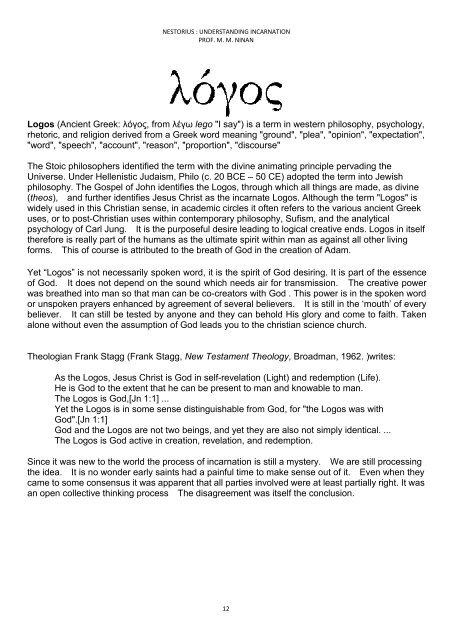Nestorius
Create successful ePaper yourself
Turn your PDF publications into a flip-book with our unique Google optimized e-Paper software.
NESTORIUS : UNDERSTANDING INCARNATION<br />
PROF. M. M. NINAN<br />
Logos (Ancient Greek: λόγος, from λέγω lego "I say") is a term in western philosophy, psychology,<br />
rhetoric, and religion derived from a Greek word meaning "ground", "plea", "opinion", "expectation",<br />
"word", "speech", "account", "reason", "proportion", "discourse"<br />
The Stoic philosophers identified the term with the divine animating principle pervading the<br />
Universe. Under Hellenistic Judaism, Philo (c. 20 BCE – 50 CE) adopted the term into Jewish<br />
philosophy. The Gospel of John identifies the Logos, through which all things are made, as divine<br />
(theos), and further identifies Jesus Christ as the incarnate Logos. Although the term "Logos" is<br />
widely used in this Christian sense, in academic circles it often refers to the various ancient Greek<br />
uses, or to post-Christian uses within contemporary philosophy, Sufism, and the analytical<br />
psychology of Carl Jung. It is the purposeful desire leading to logical creative ends. Logos in itself<br />
therefore is really part of the humans as the ultimate spirit within man as against all other living<br />
forms. This of course is attributed to the breath of God in the creation of Adam.<br />
Yet “Logos” is not necessarily spoken word, it is the spirit of God desiring. It is part of the essence<br />
of God. It does not depend on the sound which needs air for transmission. The creative power<br />
was breathed into man so that man can be co-creators with God . This power is in the spoken word<br />
or unspoken prayers enhanced by agreement of several believers. It is still in the ‘mouth’ of every<br />
believer. It can still be tested by anyone and they can behold His glory and come to faith. Taken<br />
alone without even the assumption of God leads you to the christian science church.<br />
Theologian Frank Stagg (Frank Stagg, New Testament Theology, Broadman, 1962. )writes:<br />
As the Logos, Jesus Christ is God in self-revelation (Light) and redemption (Life).<br />
He is God to the extent that he can be present to man and knowable to man.<br />
The Logos is God,[Jn 1:1] ...<br />
Yet the Logos is in some sense distinguishable from God, for "the Logos was with<br />
God".[Jn 1:1]<br />
God and the Logos are not two beings, and yet they are also not simply identical. ...<br />
The Logos is God active in creation, revelation, and redemption.<br />
Since it was new to the world the process of incarnation is still a mystery. We are still processing<br />
the idea. It is no wonder early saints had a painful time to make sense out of it. Even when they<br />
came to some consensus it was apparent that all parties involved were at least partially right. It was<br />
an open collective thinking process The disagreement was itself the conclusion.<br />
12

















